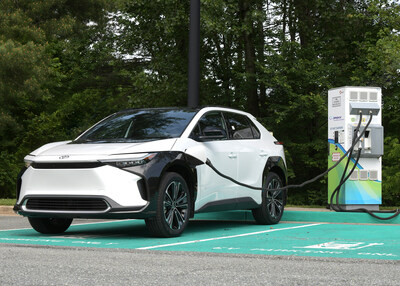Toyota and Pepco Team Up to Research Vehicle-to-Grid Technology in Maryland
Toyota Motor North America and Pepco are collaborating on vehicle-to-grid (V2G) research in Maryland using the Toyota bZ4X. This project aims to explore bidirectional power flow technology, allowing BEV owners to charge their vehicles and send power back to the local energy grid. Benefits include improved energy reliability, integration of renewables, and potential electricity cost reductions. Maryland, targeting 300,000 EVs by 2025, recently passed the DRIVE Act, requiring utilities to develop interconnection processes for bidirectional chargers. The research will occur at Pepco's Watershed Sustainability Center. Toyota plans to expand its BEV offerings to 30 models globally by 2030.
- Toyota and Pepco collaboration on innovative V2G technology.
- Potential for improved energy reliability and resilience.
- Possible reductions in electricity costs for consumers.
- Maryland's leadership in EV adoption and legislation supporting V2G technology.
- Pepco's initiative to install 250 EV chargers across key counties.
- Toyota's ambitious plans to offer 30 BEV models globally by 2030, producing 3.5 million BEVs annually.
- Uncertainties surrounding the practical implementation of V2G technology.
- Potential infrastructure challenges in scaling up the V2G charging network.
- No immediate financial benefits or specific timelines for the completion of the research.
Insights
Vehicle-to-Grid (V2G) technology represents an evolving frontier in the electric vehicle (EV) sector. It leverages the power stored in EV batteries to stabilize and support the local energy grid, particularly during peak demand periods. For retail investors, this collaboration between Toyota and Pepco indicates a strategic move towards enhancing energy resilience and leveraging renewable sources. By integrating V2G, Toyota aims to optimize the utility of their BEVs beyond transportation, potentially offering consumers a dual-purpose value proposition.
Investors should note that Maryland's legislative environment is supportive of such innovations, which might expedite the adoption and scalability of V2G technology. However, the long-term success hinges on technological robustness and consumer acceptance. The initiative aligns with Toyota's broader sustainability goals and enhances its competitive positioning in the green technology space.
The move to collaborate with Pepco on V2G technology is in line with market trends showing an increasing demand for sustainable energy solutions. For Toyota, this positions them at the forefront of the EV market, aligning with the growing consumer and regulatory focus on environmental sustainability. Furthermore, the fact that Maryland is a rapidly growing EV market with supportive legislation (such as the DRIVE Act) underpins the strategic importance of this location for pilot testing.
For retail investors, this indicates Toyota's proactive stance in not only addressing current market demands but also preparing for future regulatory landscapes. Investors should be aware that while this opens up new revenue streams and enhances brand loyalty, it also comes with the risks associated with new technology adoption and potential delays in infrastructure readiness.
From a financial perspective, Toyota's partnership with Pepco to explore V2G technology is a forward-thinking move with potential long-term financial benefits. By integrating V2G, Toyota could provide additional value to its BEV customers, potentially leading to higher sales and customer retention. The focus on bidirectional power flow could also introduce new revenue streams through partnerships with utility providers and government incentives for sustainable energy solutions.
That said, investors need to be cautious of the immediate financial implications. Research and development into V2G technology, along with the installation of required infrastructure, requires significant capital expenditure. Toyota's financial health and its ability to absorb these costs without impacting its bottom line will be crucial.
This collaborative effort aims to research sustainable energy solutions and provide local energy grid resilience
This collaboration aims to understand the needs of EV owners through their charging habits and vehicle usage, which will be crucial in driving widespread adoption of V2G technology. Nearly 80 percent of owners currently charge their EVs at home overnight when demand for energy is lower. With bidirectional capability, these vehicles could send power back to the local energy grid during peak demand hours or at other critical times, such as severe weather.
"Bidirectional charging is a great way for customers to leverage their electric vehicles in a way that supports the grids and their home electricity ecosystem," said Christopher Yang, group vice president, Toyota EV Charging Solutions. "Working with Pepco will help us understand charging and discharging use-cases, which will ultimately benefit our customers and help utility providers better understand grid demands."
"Pepco is leading the energy transformation in the communities we serve by embracing technology that is helping to drive the clean energy transition," said Tyler Anthony, president and CEO of Pepco Holdings. "V2G is designed to connect with the local energy grid and is part of our roadmap to ensure a successful and equitable energy transition. This collaboration with Toyota allows us to better understand V2G technology and its impact on the grid, our customers, and overall service reliability as we work together toward a more sustainable and resilient future for the communities we serve."
The V2G research will take place at Pepco's Watershed Sustainability Center, located at the company's Rockville Service Center in
Currently, Toyota offers two mass-market BEVs in the
About Toyota:
Toyota (NYSE:TM), creator of the Prius hybrid and the Mirai fuel cell vehicle, is committed to building vehicles for the way people live through our Toyota and Lexus brands, and directly employs more than 63,000 people in
Over the past 65 years, Toyota has assembled nearly 47 million cars and trucks in
Through our more than 1,800 North American dealerships (nearly 1,500 in the
For more information about Toyota, visit www.ToyotaNewsroom.com.
About Pepco:
Pepco is a unit of Exelon (Nasdaq: EXC), a Fortune 250 company and the nation's largest utility company, serving more than 10 million customers. Pepco provides safe and reliable energy service to approximately 944,000 customers in the
Media Contacts
Toyota Motor North America
Joshua Burns
Joshua.Burns@toyota.com
Pepco Communications
Chuck
202-872-2680
![]() View original content to download multimedia:https://www.prnewswire.com/news-releases/toyota-and-pepco-team-up-to-research-vehicle-to-grid-technology-in-maryland-302173524.html
View original content to download multimedia:https://www.prnewswire.com/news-releases/toyota-and-pepco-team-up-to-research-vehicle-to-grid-technology-in-maryland-302173524.html
SOURCE Toyota Motor North America









